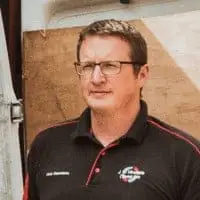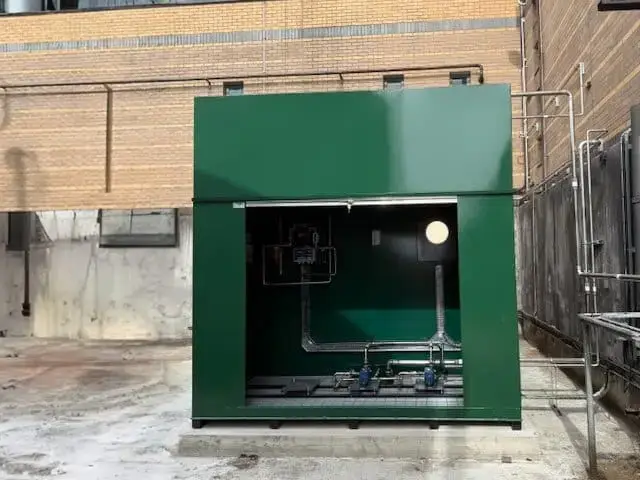Bulk Fuel Storage Tank Replacement – The Project
This case study focuses on a bulk fuel storage tank replacement at a Yorkshire hospital undertaken by JWH Tanks in 2025. The hospital trust contacted JWH Tanks as they had a number of issues, including an existing bulk tank that had failed an integrity inspection, location and space constraints, along with historical issues surrounding fuel distribution to their boilers situated on a second floor mezzanine. No day tank had ever been installed and the boilers were reliant on a duplex pump system that regularly failed. The trust had initially been told that a day tank was not feasible due to space restraints, but were keen to explore viable options so that a gravity fed supply could be achieved.
Initial Meeting and Identified Issues:
During the meeting a number of potential solutions were discussed. These took into account the requirement to meet current fuel storage standards and to ensure the needs of the hospital are met at all times whilst considering budget constraits faced by the trust.
One of the major difficulties was the issue that the boilers were 7200mm higher than ground level inside the existing tank farm. Whilst an external day tank would have been desireable, a platform or frame measuring over seven metres in height would not have been suitable for a number of reasons. It was decided to explore the idea of fabricating a day tank in situ on the mezzanine, then building a fire rated chamber around the tank to ensure compliance given the proximity of the boilers.
Another issue was the proximity of the redundant bulk tank. As with many sites such as a hospital, the original tank farm was surrounded by high concrete walls which operate as the bund. As the hospital has expanded, buildings have been erected around the tank farm, thus making access very difficult and reduced the amount of overall space available.
Research and Proposal:
To ensure the proposals were suitable, JWH consulted with parties such as Structural Engineers over the internal mezzanine, the Trust Fire Officer over the proposal of an internal day tank, and trusted crane lift specialists over the removal and installation of tanks to and from the bund area.
With all questions satisfactorily answered, a detailed and costed proposal was submitted and accepted. Upon receipt of the purchase order, JWH Tanks’ in-house teams began the work to ensure the project ran smoothly.
Fuel Storage Tank Replacement – Works Undertaken:
Temporary Supply:
A bunded temporary tank was supplied, delivered and installed to ensure no disruption to hospital operations. Existing fuel was polished from the redundant bulk tank into the temporary tank, then piped into the existing system.
Redundant Tank Decommissioning:
The redundant was a 60,000 litre, vertical cylindrical former heavy fuel oil tank. The tank had stored 35 sec heating oil for a number of years, however, no records were available to confirm if the tank had been cleaned prior to the transition. Following consultation with the crane operator, it was decided that removing the tank is sections would be the optimal solution. To achieve this, an accredited scaffold contractor was commissioned to provide a suitable access solution around the tank.
JWH Tanks in-house cleaning team then emptied and cleaned the tank to gas free standards, removed any pipework and cladding and prepared the tank for cutting into sections. The same team then cut the tank into pre-determined sections, liaised with the crane operator and safely removed the tank from the bund for disposal.
New Day Tank Installation:
The new day tank was to be positioned on a 4 metre high mezzanine, therefore a structural report was obtained for the platform to confirm the area was suitable for the weight to be installed. The new tank was then fabricated in situ using laser cut sheets from the CAD design issued to the client. Once fabricated, the tank was pressure tested, painted and positioned ready to have a fire rated chamber constructed around it. The chamber was built using block work and furnished inline with the latest OFTEC Technical Manual.
Bulk Tank Installation:
As the previous tank was positioned on a base made from sand and bitumen, a new concrete slab was designed and constructed to give a suitable and flat surface to locat the new tank. The location issues required concrete to be pumped 25 metres over a wall and into position ready for floating.
A 20,000 litre bulk tank built to BS 799-5 standards was supplied and installed using a 150 tonne crane onto the new pad. The tank was fitted with a 1.5 metre deep cabinet which houses the ancillary equipment and pumps for transferring fuel into the day tank on the mezzanine inside the energy centre.
Given the remote location of the tank and the condition of the existing offset fill point, a new lockable cabinet and 2 inch stainless steel fill line were installed onto the tank, including a mechanical overfill prevention valve.
Pipework & Ancillary Equipment:
With the two tanks being approximately 15 metres part, both required equipment to be able to operate efficiently and safely, including:
- OLE T5020 tank gauges with high, low and bund alarms – BMS relays fitted.
- T4000 day tank controller with 4 contact rigid probe for level control and failsafe (return to bulk also fitted).
- Boilerguard fire valve with fusible links, solenoid shut off valve and control panel.
- Stainless steel Mapress pipework with isolation and non-return valves and flow labelling. (Pressure Tested).
- Twin liquid ring pumps with cross over.
- Automatic timed fuel recirculation unit with magnetic, water and particulate filters.
Completion:
Upon completion of the fuel storage tank replacement, the boilers were commissioned and the area left clean and tidy. All required notifications were made and a debreif given to the client representitives. A full O&M manual was present both in hard copy and digital formal, with any requested demonstrations given by JWH Tanks personnel.
The client was extremely pleased with the installation, and continues to have a trouble free boiler operation.
We have many other case studies regarding services such as tank refurbishment, decommissioning and cleaning which can be found here.
Information on oil storage can be found from OFTEC as the leading oil fired heating trade organisation, just click here.

